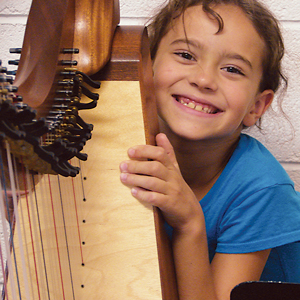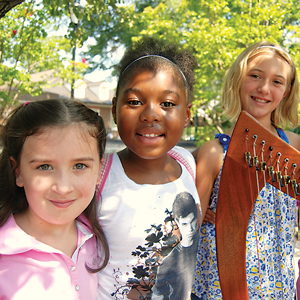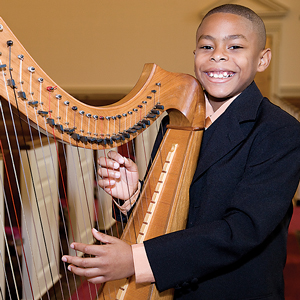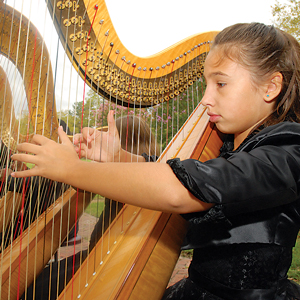 The American Youth Harp Ensemble performs in some of the world’s most prestigious venues, yet many people in Richmond aren’t aware that the world-class group exists. The group’s founder and artistic director, Lynnelle Ediger-Kordzaia, hopes to change that dynamic.
The American Youth Harp Ensemble performs in some of the world’s most prestigious venues, yet many people in Richmond aren’t aware that the world-class group exists. The group’s founder and artistic director, Lynnelle Ediger-Kordzaia, hopes to change that dynamic.
On the surface, Ediger-Kordzaia may be soft-spoken and quiet, but the Oberlin Conservatory of Music alum is a working dynamo, passionate not only about the harp but also about teaching its intrinsic value.
Since starting the non-profit HARPS Foundation-American Youth Harp Ensemble (AYHE) in 1999, the company has grown from 25 to over 350 students, making it the largest harp program in the nation. “It’s a bit like the movie ‘Field of Dreams’ – If you build it, they will come,” Ediger-Kordzaia says. “Over the years, we have had to do very little recruiting. Current families and students, most of whom stay in our programs for as long as ten years, are our best ambassadors. We have had to continually add ensembles, classes, and faculty to accommodate the growing numbers of interested students.”
The nonprofit is known nationally and internationally for its imaginative programming. “We are the leader in commissioning new works and arrangements for harp ensembles by world-renowned professional harpists,” Ediger-Kordzaia says. “On many occasions we have brought these masters to teach and perform with our students.”
Recognized nationally as a model arts education program, AYHE serves young harpists, ages 8 to 18, through five different performance ensembles beginning with the Troubadour Ensemble for elementary age students. The highest level, the elite Touring Ensemble, consists of a professional-caliber chamber ensemble of 14 harpists that perform nationally and internationally.
Many of the programs are offered yearround. “We also have special summer programs for beginning and experienced harpists alike,” Ediger-Kordzaia says.
The Summer Harp Institutes include the Richmond Summer Harp Institute, which has students from the around world, the Maryland Summer Harp Institute, and the new European Summer Harp Institute held in Austria and the Czech Republic. “We had kids audition from across the nation for the European Institute,” Ediger-Kordzaia says. “That institute led to invitations to perform in Austria, Hungary, and Italy.”
AYHE has 17 national and international tours under its belt, playing in preeminent venues such as the Kennedy Center, Carnegie Hall, the White House, the United Nations, and in the Department of State’s cultural series. Internationally, the group has performed in Paris, London, Vienna, Scotland, and the Netherlands.
Bethany Bruno says her life changed the day she first played her harp at Carnegie Hall with the company. Bruno, who is now a Presidential Scholar and freshman at the University of Virginia, performed in the renowned venue with AYHE when she was in seventh grade and again earlier this year when she was a senior in high school.
“I had come full-circle over the course of my time with the group and it meant everything to me,” she says. “The ensemble had become my family and my home. It taught me so, so much.”
Ediger-Kordzaia remembers the group’s first performance at Carnegie Hall in 2001. “To this day I remain so proud of that first group of students who achieved what no one imagined young inner-city youth would be capable of doing,” she says. “It was a monumental achievement. For all of those students, performing in Carnegie Hall set firmly in place the core belief that there is no challenge too great and no dream that is unobtainable.”
Since 2001 the group has sold out Carnegie Hall three times – this year, far in advance of the performance. “The ticket office said they were stunned,” Ediger-Kordzaia says. “They typically don’t have concerts sold out three months in advance.”
One of AYHE’s most star-studded performances occurred last year when it played at the 34th Annual Kennedy Center Honors in December. “It was a night we won’t soon forget. We received high praise from music greats and some of Hollywood’s biggest names at the medallion ceremony,” Ediger-Kordzaia says. “Composer and conductor John Williams cried ‘Bravo!’ After our performance of ‘Jupiter’ from The Planets, and [violinist] Itzhak Perlman snapped lots of pictures of us.”
The young harpists met everyone from singers James Taylor and Lionel Ritchie to actresses Meryl Streep and Glenn Close. At one point during the evening, Ediger-Kordzaia caught a glimpse of a woman dancing to the group’s music. That woman, she soon discovered, was famed choreographer Twyla Tharp who made it a point to say AYHE’s performance made her night.
While the performance opportunities are exhilarating, it’s the HARPS Foundation that warms Ediger-Kordzaia’s heart. The foundation is a vital part of her vision to not only create awareness of the harp’s therapeutic value, but also to provide programs and performance opportunities for children who wouldn’t have had that opportunity because of their financial means or because of a disability.
As part of its mission, the foundation offers three different therapeutic harp programs in partnership with different health care partners. “Our therapeutic harp programs are on the cutting edge of the complementary care movement in the country,” Ediger-Kordzaia says.
Bruno, the UVA student, served as a mentor in the Harp Therapy Outreach Program, which provides harp and music instruction to at-risk youth as well as students with mental and physical disabilities. She developed a close relationship with a young girl in the program. “Originally she was an extremely shy student but when she completed the program, she was much more confident,” Bruno says. “She loved Hannah Montana so for her final concert we learned to play the ‘Best of Both Worlds’ and she nailed it.”
Aponi Brunson, who was a member of AYHE for three years and now works for the group, was also involved in the program. “It increases the students’ cognitive ability and helps with physical coordination, strength, and dexterity,” she says, adding that working with the program has been rewarding. “I love to help others. It was a great fit for me.”
The group’s Harping in the Hospitals program gives students the opportunity to provide weekly harp therapy services to local health care facilities and hospitals. It also has allowed the group to participate in clinical studies focusing on the harp’s calming effect on patients. “The program creates and implements clinical studies designed to measure the impact of live harp music in areas such as health and well-being and pain reduction,” Ediger-Kordzaia says, adding that they have also been part of studies on the impact on sleep, heart rates, and sundowner’s syndrome, which affects Alzheimer’s patients. “Hopefully we will be doing a study with cancer patients but we are waiting on approval.”
The remaining Noah’s Children Harp Therapy program provides harp therapy in hospital and home hospice settings for children and their families under the Noah’s Children banner as well as harp instruction. Noah’s Children is the only pediatric palliative care organization in central Virginia.
The HARPS Foundation also provides mentoring and community services programs and offers tuition-free educational outreach programs for at-risk youth. It works with The Boys and Girls Club and St. Andrew’s School, which was established in 1894 to offer tuition-free education to children of limited financial resources. Eighteen students at St. Andrews take advantage of harp and violin lessons through the Sound Experiences program. “Our students would not have the opportunity to play a musical instrument otherwise,” says Judy Bice, the school’s director of enrichment. In addition to learning music, students have enhanced their learning skills and had the opportunity to participate in groups. “They also have gotten performance experience which helps in self-confidence and the development of self-esteem.”
Bice finds that students in the program take on more responsibility, develop longer attention spans, and learn to support one another. “Also, their parents have had something to brag about and have had the opportunity to see and hear their children on stage,” she says.
 The program dovetails with St. Andrews’ mission to educate the whole child. “They [HARPS Foundation AYHE] have sent us expert teachers that care about the children and use their expertise to enlarge their world,” Bice says. “Our initial testing in reading and math for our students who have started in the program shows improvement in those academic areas. Just learning to appreciate music can be a solace for all children, but especially for our students who may face tougher everyday stresses than most.”
The program dovetails with St. Andrews’ mission to educate the whole child. “They [HARPS Foundation AYHE] have sent us expert teachers that care about the children and use their expertise to enlarge their world,” Bice says. “Our initial testing in reading and math for our students who have started in the program shows improvement in those academic areas. Just learning to appreciate music can be a solace for all children, but especially for our students who may face tougher everyday stresses than most.”
Bruno finds that harp music is particularly powerful. She recalls a special moment when AYHE played a Carnegie Hall preview concert at Sacred Heart Cathedral in Richmond. “The way the music reverberated off of everything through the building, swallowing everything and everyone up in its power was absolutely phenomenal,” she says. “It’s something I will never forget.”




